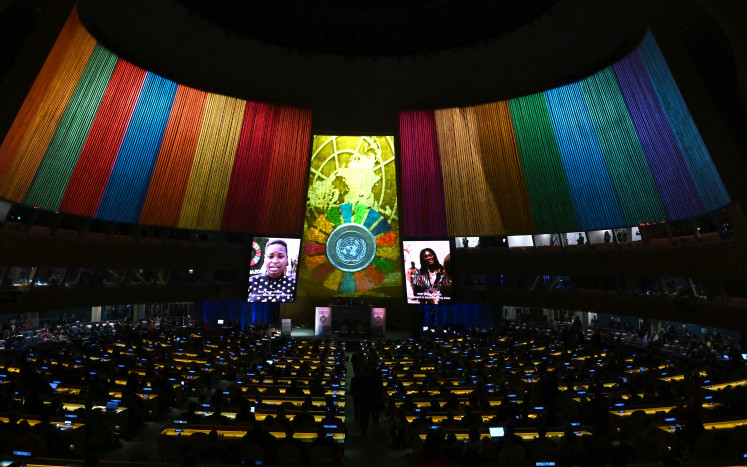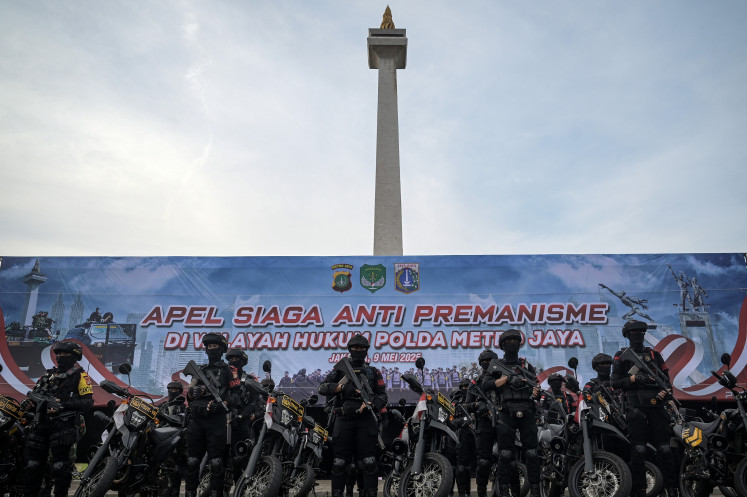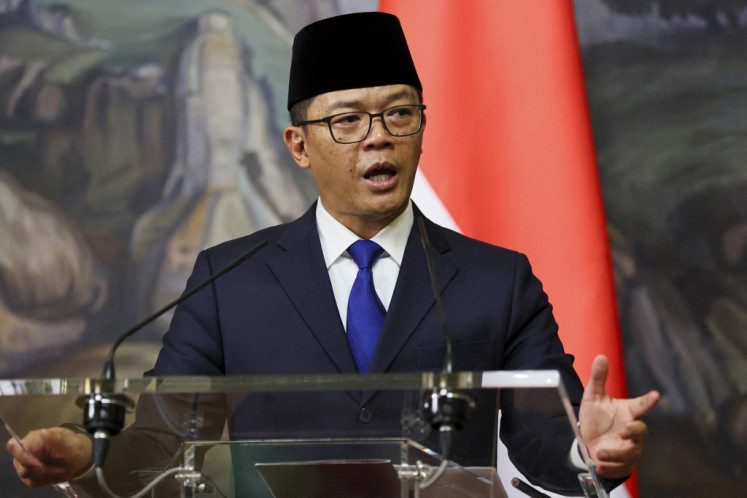Popular Reads
Top Results
Can't find what you're looking for?
View all search resultsPopular Reads
Top Results
Can't find what you're looking for?
View all search resultsPublic opinion: Between 'haters' and 'lovers'
Never before in the history of Indonesian politics have we observed a tense relationship between supporters and critical groups.
Change text size
Gift Premium Articles
to Anyone
 Social media as an outlet for us to understand political reality-framing is divided into two groups: The practical and the critical. (Shutterstock.com/mama_mia)
Social media as an outlet for us to understand political reality-framing is divided into two groups: The practical and the critical. (Shutterstock.com/mama_mia)
H
ow can we understand the form of political participation among Indonesians over the past years? From a general impression, it would be easy for us to conclude that political participation has increased as political rights, such as freedom of expression, freedom to form association, are now guaranteed.
The University of Gadjah Mada, in cooperation with Oslo University, held a 2014 democracy survey. The result of the survey conducted on 600 respondents indicated that political participation of the public in Indonesia has certainly advanced.
Other democracy surveys held by the Indonesian Democracy Index have shown similar results with regard to political participation.
If we use social media as an indicator of political participation, we can observe that citizens can express their political opinions on any issues. If we examine more how opinions are expressed, we can identify three of the most popular ways that the public perceives public issues through social media.
First, practicality and less complexity is what the public loves most. In the case of the transportation issue in Jakarta, ride-hailing application Go-Jek, and its founder, are the new heroes. It is regarded as a major solution to transportation problems in the capital city. But public opinion pays less attention to how complex the situation is. Gojek is indeed a solution but it does not address the roots of Jakarta’s transportation problems.
Transportation relates to many issues such as the revitalization of old buses and minibuses, competition between transportation business providers, routes and the number of cars and motorcycles, which keeps increasing compared with the amount of road available.
The same practical thinking can be observed in the solution to flooding problems in Jakarta. The eviction of low-income citizens in Jakarta is regarded as the only solution for the problem.
Second, practicality is a result of political framing. A complex reality of public issues is framed, both through the media and social media. This political framing is conducted both by political leaders, who are also politicians, and by their political consultants, supported by their social media armies. Political framing distorts reality and creates bias. These biases are mobilized through the media. Indonesian politics has shifted from mass mobilization to bias mobilization.
In the case of finding solutions to flooding, the framing is not only of the practical solution, but also of low-income citizens in Jakarta. The poor are regarded as people who oppose policies for the betterment of the city, who are not thankful for what the government has done and who cannot be disciplined. The majority of the public, through social media supports these allegations
Third, there has been a tendency to glorify the role of an individual, a person, detached from any affiliations he or she could possibly have. The Go-jek CEO, political leaders in any areas who issue populist policies, the handsome policeman who plays a major role during a terrorist attack, are the new heroes. The public care less about the institutions that contributed to their roles. The 2014 democracy survey also confirms this tendency, on the rise of “individual politics” in Indonesian politics.
Democratic institutions such as political parties, and grassroots movements are not preferred by the public. Political parties are seen as decadent and corrupted by their leaders and membership. This is why individual candidates in local elections are regarded as the best solution for Indonesian electoral democracy. According to popular opinion, parties are becoming obsolete, as well as the representative-democracy system. They are seen as having failed to provide any concrete and practical solutions for problems that citizens face daily. Social movements and critical groups can see nothing good that government has done. Individuals, detached from parties, are the only relevant issue.
None of the above mentioned features of public participation in social media are typical only of Indonesia. It seems citizens all over the world are tired with complex problems whose solutions need more time, more effort, more understanding and with no guarantee of a satisfactory solution. That which is handy and practical simplifies the situation.
All these simplifications are understandable. Who wants a complex life anyway? It becomes a problem when diversity of opinion in the media becomes a way to label each group as “haters” or “lovers”, known popularly as “buzzers”. Social media as an outlet for us to understand political reality-framing is divided into two groups: The practical and the critical. The critical, who usually think in a more participatory and idealistic way, are labeled as “haters” of issues that they criticize. Never before in the history of Indonesian politics have we observed a tense relationship between supporters and critical groups.
Is all of this good for Indonesian democracy? Partly it is good as the public speak louder now on many issues. Yet, partly it is not good, as diversity of opinion among citizens is labeled in an undemocratic way. Democracy provides room for differences and facilitates healthy discussion, not to label each other pejoratively.
***
The writer is a research fellow at the Department of Politics and Social Change, Australian National University. The views expressed are her own.
---------------
We are looking for information, opinions, and in-depth analysis from experts or scholars in a variety of fields. We choose articles based on facts or opinions about general news, as well as quality analysis and commentary about Indonesia or international events. Send your piece to community@jakpost.com.









